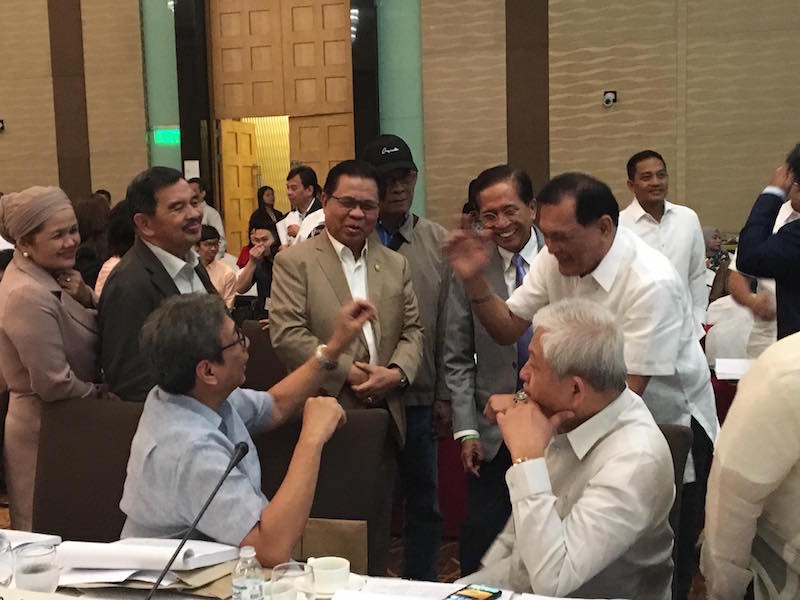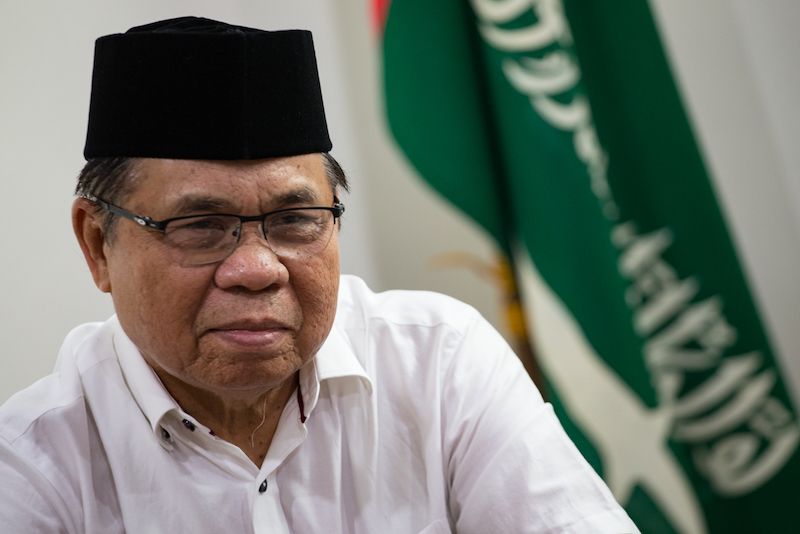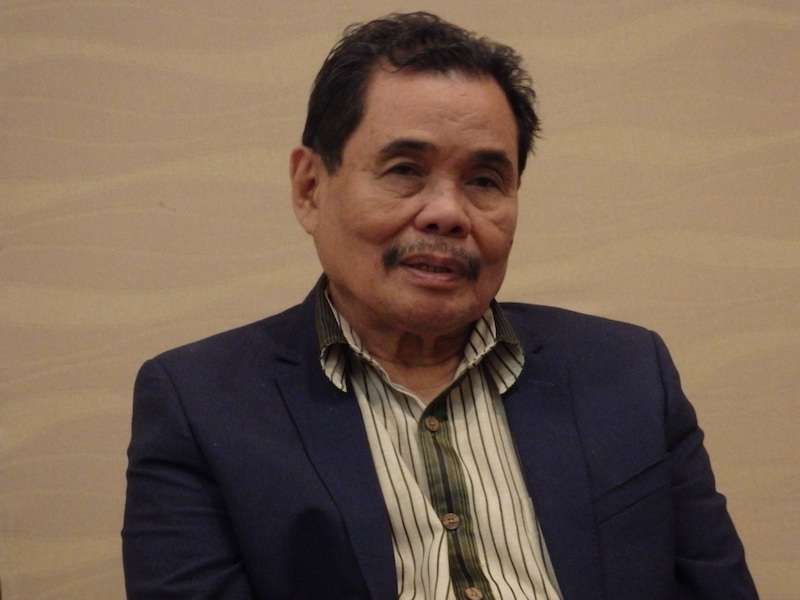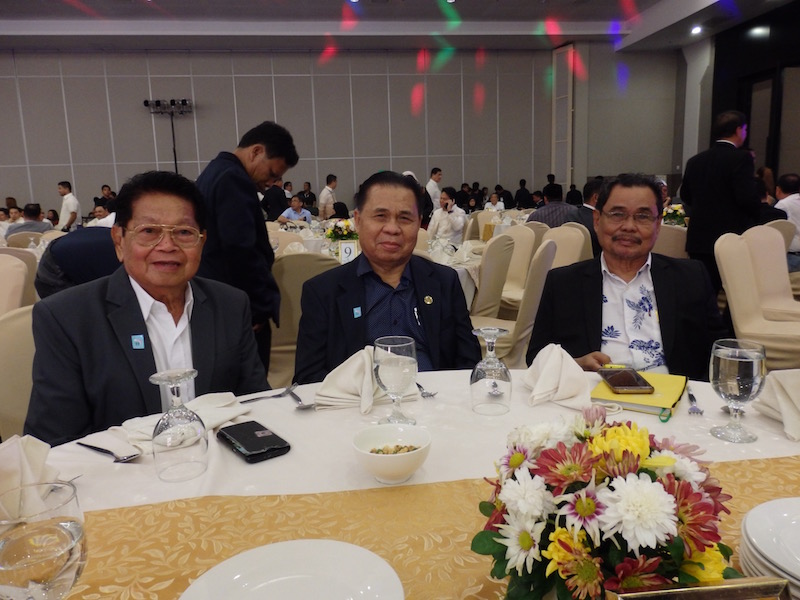QUEZON CITY (MindaNews / 14 July) — The chair of the Moro Islamic Liberation Front (MILF) said they will hold consultations with the Bangsamoro people as soon as they get the “final clean copy” of the proposed Bangsamoro law version of the Bicameral Conference Committee (bicam) but will likely accept it as it is “initially estimated to be 80 to 90% CAB-compliant.”
“CAB-compliant” refers to compliance with the Comprehensive Agreement on the Bangsamoro (CAB), the peace agreement signed by government and the MILF in March 2014.
“We are waiting for the final clean copy of the BBL (Bangsamoro Basic Law) to start our consultation process. We hope to complete the consultation and come up with final decision before the scheduled signing by the President on or before his SONA (State of the Nation Address), MILF chair Al Haj Murad Ebrahim told MindaNews on Friday, adding the “chances of it being accepted seem high.”
Presidential Adviser on the Peace Process Jesus Dureza brought Murad and Muslimin Sema of the Moro National Liberation Front into the Grand Ballroom of Crowne Plaza in Ortigas, on Day 1 of the bicam session to meet its members. “Handshake is a good way to help push BBL,” Dureza said
 Before the meeting of the Bicameral Conference Committee started on Monday morning, July 9, 2018, Presidential Adviser on the Peace Process Jesus Dureza brought into the meeting venue — the ballroom of Crowne Plaza Hotel in Ortigas — the chair of the Moro Islamic Liberation Front, Al Haj Murad Ebrahim (third from left, beside Dureza), and Muslimin Sema of the Moro National Liberation Front (MNLF) beside his wife, Rep. Bai Sandra Sema, Deputy Speaker for Mindanao “o meet members of the bicam. Photo courtesy of OEBONE ENOBIO
Before the meeting of the Bicameral Conference Committee started on Monday morning, July 9, 2018, Presidential Adviser on the Peace Process Jesus Dureza brought into the meeting venue — the ballroom of Crowne Plaza Hotel in Ortigas — the chair of the Moro Islamic Liberation Front, Al Haj Murad Ebrahim (third from left, beside Dureza), and Muslimin Sema of the Moro National Liberation Front (MNLF) beside his wife, Rep. Bai Sandra Sema, Deputy Speaker for Mindanao “o meet members of the bicam. Photo courtesy of OEBONE ENOBIO
Murad told MindaNews in a sit-down interview on June 7 that the Senate and House versions of the BBL were “very diluted” and that they would consult their people whether or not to accept the proposed law after the bicam shall have come up with a final version. “Even if we accept it, if the people don’t accept it, don’t support us, then we cannot do much if the people will not support us,” he added.
The MILF’s consultation period, however will be less than a week as the bicam will resume deliberations on July 17and hopefully finish on the same day or the next day and the SONA is scheduled on July 23.
MILF peace implementing chair Mohagher Iqbal Iqbal is definite about accepting the bicam version. “Yes, MILF will accept but we (will) continue to find ways to have those not included to be realized in the future. All that are not provided for in the BBL can still be pursued in many ways,” he told MindaNews on Friday.
He said the bicam version “provides many key elements in addressing the historical injustices committed against our people. It captures many if not most of the issues and concerns in the peace negotiations.”
Just before suspending the Day 4 session at 12:50 a.m. on Friday, Senate Majority Leader Juan Miguel Zubiri said they are “99% done” and will only need to review the clean copy and “clean up” three sections over which they had already agreed in principle. The bicam will resume its meeting on July 17, one year to the day the BBL was submitted to President Rodrigo Duterte in Malacanang in the presence of then Senate President Aquilino Pimentel III and House Speaker Pantaleon Alvarez, Jr.
“I commit to support – in front of everybody – my covenant with you that I will support and husband this instrument as it goes in the legislator for its consideration,” the President said then. “I am for this — within the context of the Republic of the Philippines, there shall be a Bangsamoro country,” he said.
The bicam has renamed BBL as the “Organic Law for the Bangsamoro in the Autonomous Region in Muslim Mindanao (OLBARMM) and the new autonomous political entity as the Bangsamoro in the Autonomous Region in Muslim Mindanao (BARMM).
Major gains, major losses
Asked what he considers to be their major gains, Murad cited the “ministerial form of government and fiscal autonomy” but considers as major losses “the principle of power-sharing, the deletion in the Preamble and other sections of parity of esteem, asymmetrical relations and the right to self-determination, and the “succeeding plebiscite on the contiguous areas” or periodic plebiscite.
 Al Haj Murad Ebrahim, chair of the Moro Islamic Liberation Front, acknowledges in a sit-down interview late Thursay afternoon, June 7, 2018, in the MILF’s Camp Darapanan, Sultan Kudarat in Maguindanao. that that Bangsamoro Basic Law versions that the House of Representatives and the Senate passed is “very diluted” but hopes something can still be done at the level of the Bicameral Conference Committee on July 9 to 13. MindaNews photo by MANMAN DEJETO
Al Haj Murad Ebrahim, chair of the Moro Islamic Liberation Front, acknowledges in a sit-down interview late Thursay afternoon, June 7, 2018, in the MILF’s Camp Darapanan, Sultan Kudarat in Maguindanao. that that Bangsamoro Basic Law versions that the House of Representatives and the Senate passed is “very diluted” but hopes something can still be done at the level of the Bicameral Conference Committee on July 9 to 13. MindaNews photo by MANMAN DEJETO
The BTC-drafted BBL provides that five years after the ratification of the law and every five years thereafter for a period of 25 years, a plebiscite shall be held in the cities, municipalities, and other geographic areas which were not able to join the Bangsamoro; and contiguous provinces, cities, municipalities, barangays, and other geographic areas particularly mentioned in the 1976 Tripoli Agreement and 1996 Final Peace Agreement, “to determine whether or not they desire to join the Bangsamoro.”
Senate Bill 1717 and House Bill 6475 deleted this provision. Legislators referred to it as “creeping expansionism” but Iqbal says it is not expansionism but “restoration” of the Bangsamoro homeland should residents in these areas opt to join the Bangsamoro later.
Murad said he has mixed feelings — happy and worried — about the bicam’s version
He said he is happy because “finally the process is about to be completed” but worried because “the bigger challenges are coming up, to work out its acceptance to the Bangsamoro and ensure the success in its implementation.”
“If the result of the bicam turns out acceptable and implemented and managed properly, it can serve as one of the major solutions,” Murad said as he explained that “the Bangsamoro problem is a result of decades of injustices and cannot be easily solved by one instrument alone. That is why we established the transitional justice committee that came up with several recommendations to address both the short and long term effect of the injustices.
Salamat Hashim
Zubiri suspended the session in the early hours of July 13, the 15th death anniversary of ILF founding chair Ustadz Salamatn Hashim, MILF chair.
Asked if Salamat would have accepted the bicam version of what is supposed to be the enabling law of the CAB, Murad said “the late chairman always upheld the principle of consultation and usually accepted its result.”
 Mohagher Iqbal, MILF peace panel chair from 2003 to 2016, peace implementing panel chair since 2016. MindaNews photo by CAROLYN O. ARGUILLAS
Mohagher Iqbal, MILF peace panel chair from 2003 to 2016, peace implementing panel chair since 2016. MindaNews photo by CAROLYN O. ARGUILLAS
Iqbal said Salamat “will accept but what is not sure is whether he will join the BTA (Bangsamoro Transition Authority that will be the interim government until the election of the BARMM leaders.
It is his personal view, he said, that if Salamat were still alive, as political and ideological leader, he will not join the BTA or run for a position in the 2022 election of the first set of BARMM officials.
MindaNews also sent MILF 1st Vice Chair Ghazali Jaafar, the BTC chair, the same questions asked of Murad and Iqbal but he sent no reply.
Jaafar, then MILF Vice Chair for Political Affairs was the first chair of the MILF peace panel which entered into formal negotiations with government in 1997. Murad, then MILF Vice Chair, served in a concurrent capacity as MILF peace panel chair from 2001 to 2003. He assumed the chairmanship when Salamat passed away in July 2003. Iqbal served as peace panel chair from 2003 to 2016, was BTC chair from 2014 to 2016 and peace implementing chair under the Duterte administration.
 MILF peace panel chairs: (L to R) Ghazali Jaafar (1996-1998), Al Haj Murad Ebrahim (2001 to 2003) and Mohagher Iqbal (since 2003). The three attended the Eid’l Fitr celebration with President Rodrigo Duterte at the SMX Convention Center in Davao City on 16 June 2018. MindaNews photo by CAROLYN O. ARGUILLAS
MILF peace panel chairs: (L to R) Ghazali Jaafar (1996-1998), Al Haj Murad Ebrahim (2001 to 2003) and Mohagher Iqbal (since 2003). The three attended the Eid’l Fitr celebration with President Rodrigo Duterte at the SMX Convention Center in Davao City on 16 June 2018. MindaNews photo by CAROLYN O. ARGUILLAS
Robert Maulana Aloto, a member of the MILF peace panel that negotiated with the government the 2012 Framework Agreement on the Bangsamoro and the 2014 CAB, posted on his Facebook page that Salamat would not have accepted the bicam version because it is “more than ARMM.”
Alonto recalled that in 2003, when Salamat was in the mountains of Lanao del Sur after the Arroyo administration’s attack on Buliok, Maguindanao, “the Arroyo regime secretly offered to him an ‘enhanced ARMM’ but Salamat rejected it as “tae a aso” (dog shit).
“The point is that ARMM, whether less of it or more of it, is not the benchmark for accepting or non-accepting a Congress-made ‘BBL’. The benchmark will have to be and ought to be the signed political agreements – the FAB and CAB. No more, no less. For what good will peace agreements be if at the end of the day the parties don’t abide by them? As one observer rightly opined: The consistent failure to implement agreements designed to end conflicts is closing the door to future peace negotiations or resolving conflicts through peaceful means,” Alonto said. (Carolyn O. Arguillas / MindaNews)
